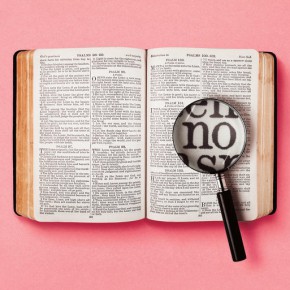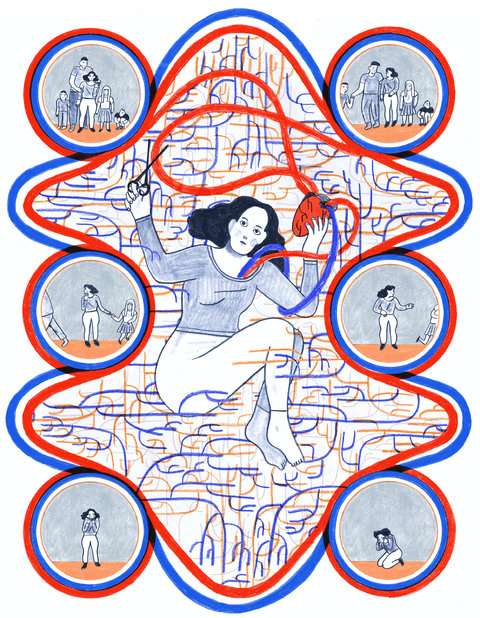
Last week, William Irwin wrote an op-ed for the New York Times’ philosophy forum, The Stone, called “God Is a Question, Not an Answer.” Despite the nauseating title, and the ever more nauseating 2,000-plus comments that have come in the week since it has been published, the article asks a lot of tough questions about the nature of faith in an era that loves expressing itself in the semantics of certainty.
 What’s so compelling about Irwin’s article is that he sees the same dedication to certainty on both sides of the “faith” question. In other words, to Irwin, those who staunchly claim there is no god are just as disengaged with uncertainty as the apologists for intelligent design. Doubt, whether you admit it or not, is a leveling reality—it is part of being a living, breathing, thinking human being.
What’s so compelling about Irwin’s article is that he sees the same dedication to certainty on both sides of the “faith” question. In other words, to Irwin, those who staunchly claim there is no god are just as disengaged with uncertainty as the apologists for intelligent design. Doubt, whether you admit it or not, is a leveling reality—it is part of being a living, breathing, thinking human being.
Irwin notes the famous description of Herman Melville by Nathaniel Hawthorne: “He can neither believe, nor be comfortable in his unbelief; and he is too honest and courageous not to try to do one or the other.”
Anyone who does not occasionally worry that he may be a fraud almost certainly is. Nor does the worry absolve one from the charge; one may still be a fraud, just one who rightly worries about it on occasion. Likewise, anyone who does not occasionally worry that she is wrong about the existence or nonexistence of God most likely has a fraudulent belief. Worry can make the belief or unbelief genuine, but it cannot make it correct.
People who claim certainty about God worry me, both those who believe and those who don’t believe. They do not really listen to the other side of conversations, and they are too ready to impose their views on others. It is impossible to be certain about God.
 While I don’t think that “God is a question,” I can certainly relate to the worry of fraudulence. Who hasn’t, at one time or another, wondered if they put their existential eggs in the wrong basket—or a nonexistent basket? Who hasn’t had their doubts? Irwin is arguing that doubt is as much a part of the faith continuum as belief is, which may be an especially bitter pill for the ‘believers’ to swallow: that, within themselves, they wrestle with the very atheist they have committed themselves not to be.
While I don’t think that “God is a question,” I can certainly relate to the worry of fraudulence. Who hasn’t, at one time or another, wondered if they put their existential eggs in the wrong basket—or a nonexistent basket? Who hasn’t had their doubts? Irwin is arguing that doubt is as much a part of the faith continuum as belief is, which may be an especially bitter pill for the ‘believers’ to swallow: that, within themselves, they wrestle with the very atheist they have committed themselves not to be.
But Irwin also reminds us not to lionize doubters like Melville, either. Talking about our doubts, while it may be courageously honest, doesn’t make you any more correct. And it has definitely been oversold in today’s trends of non-offensive discourse. Nowadays, we talk about “bringing our questions to the table.” We talk about “expanding dialogue.” But no one wants to doubt their position. If doubting is heroic, it is only heroic in the same way that suffering is heroic. It doesn’t feel good. There isn’t an uplift that comes with accepting you might be wrong about something—especially if that something happens to mean everything to you.
And this is obvious. I would recommend taking a look at the comment thread of Irwin’s article for a quick sampling, but don’t waste your time. You already know what the comments say. You can guess how defensively acerbic they are. How the vitriol doesn’t convey clarity, but instead betrays a deep woundedness. These are people who once doubted and felt punished for it. The reactivity is palpable. Whether you’re an atheist or an orthodox believer, certainty remains the rule. No one wants to be a doubter.
If we look at our own lives, we might say that religion, more often than not, presents a face that looks more certain than an individual believer feels on a given Sunday morning. Maybe this is because we just put out the Church Issue, but I have a hard time thinking about doubt as anything other than a “no-no” word within the world of historic doctrines and creeds and scriptures. It is easy to see how the stalwart settings of organized faith can unwittingly lend the backdrop for so many of our wounds. We don’t call it “burned” for no reason. When we feel alone in our uncertainty, a wall of answers is still a wall.
This is why the “Doubting Thomas” story comes fast on the heels of Easter. Like Thomas, we have seen the supreme disappointment of the cross, and the seeming fraudulence of our own faith, and are skeptical the resurrection is too much to hope for.
But Thomas, one of the twelve, was not with them when Jesus came. So the other disciples told him, “We have seen the Lord.” But he said to them, “Unless I see the mark of the nails in his hands, and put my finger in the mark of the nails and my hand in his side, I will not believe.”
A week later his disciples were again in the house, and Thomas was with them. Although the doors were shut, Jesus came and stood among them and said, “Peace be with you.” Then he said to Thomas, “Put your finger here and see my hands. Reach out your hand and put it in my side. Do not doubt but believe.”
So much of the time, our doubts are inextricable from our suffering. Our uncertainty comes checkered not just with rational quandaries, but with old wounds and long-hardened psychological defenses, with identities fortified against the kind of wounds that hurt us before. Thomas is uncertain, but he needs so much more than answers—and so much more than the veneration of his doubt. He needs a miracle. Something must pierce his cautious skepticism despite him. And strangely enough, someone does–he is pierced in the pierced side of God Almighty. His protective woundedness is healed by the wounds of his faithful savior.

COMMENTS
One response to “So You Have Your Doubts…”
Leave a Reply













This is beautiful. So well said, E.